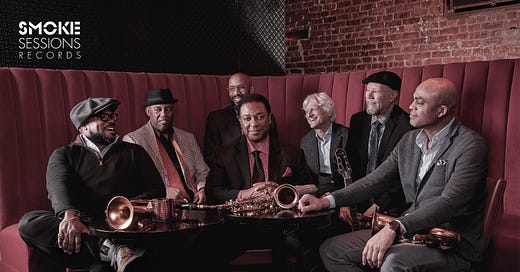It was a humid evening in late spring when Vincent Herring found himself standing in the dimly lit practice room, the air thick with the scent of aged wood and lingering melodies. The glow from the streetlamp outside cast a soft light through the window, illuminating the posters of Jazz legends that adorned the walls—Dizzy Gillespie, Freddie Hubbard, Cannonball Adderley. Each face seemed to nod approvingly as Herring glanced around the room, feeling the weight of history and expectation pressing gently against his chest.
Herring picked up his alto saxophone, the cool metal familiar and comforting against his fingers. Tonight, he was not alone. Gathered around him were the members of Something Else!, a supergroup he had painstakingly assembled over months of late-night calls and quiet conversations in smoky bars. Jeremy Pelt, the trumpeter with a fiery spirit and a soul that echoed the greats. Wayne Escoffery, the tenor saxophonist whose notes could whisper or wail with equal intensity. Paul Bollenback, whose guitar could conjure storms or soothe with a single chord. David Kikoski on piano, Essiet Essiet on bass, and Otis Brown III on drums, each a master in their own right, each bringing their unique voice to the collective symphony.
As they settled into their places, the room fell into a hush, the kind of silence that preludes magic. Herring looked at his companions, seeing not just musicians but kindred spirits who shared his vision. The room seemed to vibrate with anticipation as he lifted his saxophone to his lips, signaling the beginning of their journey.
The first notes of Horace Silver’s “Filthy McNasty” burst forth like a long-contained flood, the groove infectious and irresistible. Essiet and Brown locked into a rhythm that was both relentless and liberating, driving the band forward with a propulsion that seemed to defy gravity. Herring’s saxophone danced through the air, weaving in and out of Pelt’s bright trumpet calls and Escoffery’s deep, resonant tones. Kikoski’s piano flirted with dissonance, only to resolve into moments of pure, unadulterated joy, while Bollenback’s guitar sliced through the mix with precision and grace.
The music flowed effortlessly, a conversation between friends who knew each other’s stories by heart. Each solo was a chapter, each riff a punctuation mark in their shared narrative. They moved seamlessly from the bristling energy of “Filthy McNasty” to the languid, blues-soaked intro of “Too Blue,” where Kikoski’s keys seemed to drip with melancholy, Bollenback’s guitar slithered seductively, and the saxophones crooned in a soulful dialogue.
It was more than just notes and rhythms; it was a resurrection of an era, a reclamation of a sound that had once defined the lives of countless listeners. Herring felt a deep connection to the past, to the records his parents had played on lazy Sunday afternoons and during spirited gatherings. The music of soul and R&B that had been the backdrop of his childhood now found new life in this room, among these musicians.
The session continued, each track a testament to the power of groove and the unspoken understanding that bound them together. Eddie Harris’ “Mean Greens” swung with a lurching shuffle, Kikoski’s jabs punctuating the air with sharp precision. Pee Wee Ellis’ “The Chicken” brought pure funk bliss, Essiet’s bassline a wide, solid foundation upon which the others built their intricate tapestries. Herbie Hancock’s “Driftin’” floated on an airy rhythm, the soloists reveling in the spacious yet exacting swing.
As the night deepened, the mood turned contemplative with Donald Byrd’s “Slow Drag,” a piece that lingered in the shadows, rich with longing. Roy Hargrove’s “Strasbourg/St. Denis” crackled with a handclap-fueled energy that was both celebratory and reflective. And then there was the surprise of the evening—John Coltrane’s “Naima.” Though not typically associated with Soul Jazz, Herrings transformative rendition fit seamlessly into the tapestry they were weaving, a timeless ballad given new breath.
When the final note faded into the stillness, the room was charged with an electric silence. Herring lowered his saxophone, a satisfied smile playing on his lips. This was more than just music; it was a feeling, a living, breathing entity that had taken form in their hands. It was Soul Jazz in its purest essence, a celebration of roots and rhythms that transcended time.
He glanced around at his bandmates, their faces glowing with the same exhilaration he felt. This was what they had been craving, what they had been born to play. “This is just meant to be great music that feels good,” he had told them. And as they stood there, basking in the afterglow of their creation, he knew they had achieved something extraordinary. They had captured the soul of an era and made it their own, and in doing so, they had created something else entirely.
Due Out June 14, 2024 on Smoke Sessions Records






Fun read! So many surprising word choices bring the description to life -- kind of like jazz, come to think of it.